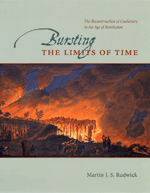Giant Book of the Month Club
 The phenomenon of Biblically Correct Tours is much in the news recently. (P.Z. Myers has a summary). Essentially, a creationist named Rusty Carter leads people on tours around museums chatting away about how dinosaurs and people lived together, how the world was created in seven days, and how the earth is only six thousand years old, ad nauseam. So I thought I’d mention Martin Rudwick’s new book, Bursting the Limits of Time: The Reconstruction of Geohistory in the Age of Revolution, a (very, very large) history of how scientists in the late eighteenth and early nineteenth centuries figured out that the earth was very, very old. Certainly much older than six thousand years. The problem of the age of the earth is a good one partly because because it’s so tangible, partly because it’s a good story (the French and English scientists are great, and Thomas Jefferson gets a look-in as well), and partly because it was solved[1] more than two hundred years ago. Richard Fortey reviewed the book in the LRB (subscription req’d) recently. He begins the review with an anecdote:
The phenomenon of Biblically Correct Tours is much in the news recently. (P.Z. Myers has a summary). Essentially, a creationist named Rusty Carter leads people on tours around museums chatting away about how dinosaurs and people lived together, how the world was created in seven days, and how the earth is only six thousand years old, ad nauseam. So I thought I’d mention Martin Rudwick’s new book, Bursting the Limits of Time: The Reconstruction of Geohistory in the Age of Revolution, a (very, very large) history of how scientists in the late eighteenth and early nineteenth centuries figured out that the earth was very, very old. Certainly much older than six thousand years. The problem of the age of the earth is a good one partly because because it’s so tangible, partly because it’s a good story (the French and English scientists are great, and Thomas Jefferson gets a look-in as well), and partly because it was solved[1] more than two hundred years ago. Richard Fortey reviewed the book in the LRB (subscription req’d) recently. He begins the review with an anecdote:
… as I had anticipated, a caller from Kentucky duly declared that the world had been created in seven days, and what did I have to say to that? I invited the caller to ask himself whether, when his grandfather used the words ‘in my day’, he meant one particular day, or rather a season or a phase of life. I went on to say that the biblical ‘days’ could be better understood as whole eras, domesticated by a familiar terminology in order to make them comprehensible. Had I but known it, the same argument had already been thoroughly rehearsed by French naturalists more than two hundred years earlier. My creationist caller was restating a position which was already unfashionable in the late 18th century.
People like Rusty Carter make you appreciate scholars like Rudwick—not to mention the Enlightenment.
fn1. I mean it was established that the earth wasn’t just a few thousand years old. Debates about how old it was, exactly, continued for a long time afterward.